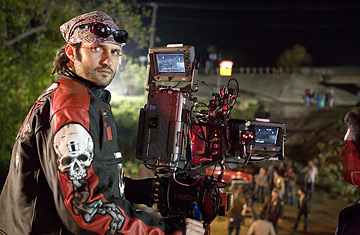
Director Robert Rodriguez, on the set of Grindhouse.
Back in the early 80s, the hit series Dallas kept the nation guessing with its season-ending cliffhanger Who Shot J.R.? Now, with a film version of Dallas starring John Travolta in development, the more appropriate question could be, Where to Shoot J.R.? If the filmmakers hope to tap into a new $22 million Texas fund aimed at boosting the state's film and computer-game industry, they'll have to agree to a controversial caveat, which denies support to any creative project that "portrays Texas or Texans in a negative fashion."
Could J.R. Ewing be a deal killer? That is the sort of question Bob Hudgins, head of the Texas Film Commission, will have to grapple with when the new funding law kicks in this fall. The commission will review movie scripts and game design plans before approving up to a 5% rebate of a film's Texas-based costs (up to a maximum of $2 million) or a $250,000 grant for a game design project; the project must have 80% of its work done within the state, and the money that will only be rewarded after it is completed. "We are going to look at the total film, not just one scene," Hudgins said. "We are going to use our best judgment." A veteran of the film industry, Hudgins said he is sensitive to industry concerns — "I take this responsibility very, very seriously," he said — but he notes it is quite normal for other kinds of grants to come with conditions.
About 40 states have film industry incentives, and most block funding for films deemed obscene, but the broad language of the Texas law has raised First Amendment concerns for the Motion Picture Association of America. "It has serious constitutional overtones," Vans Stevenson, senior vice president for state government affairs, said. The MPAA also is watching a North Carolina bill now before the Senate Finance Committee that would limit film tax credits to those films that have "serious artistic merit" and also mandates consideration of the "general standards of decency and respect for the diverse beliefs and values of the citizens of North Carolina." The amendment was prompted by outrage of some conservative politicians over the filming of Hounddog in North Carolina, the dark 2006 drama which featured a rape scene involving then 12-year-old actress Dakota Fanning.
Before the Texas bill was signed earlier this month on an Austin sound stage, the MPAA urged Gov. Rick Perry in a letter to veto the legislation. "Motion pictures made in the United States are the most popular form of entertainment worldwide because filmmakers are free to tell stories on film without fear of government censorship." Perry dismissed such concerns, saying censorship was "not going to happen" in Texas. But Stevenson warns that the caveat will backfire and hurt the Texas' effort to woo back film business it has been losing to other states, which have passed more generous tax credit and incentive programs.
In the past, the state had relied on its popularity with directors like Quentin Tarantino, Robert Rodriguez, Richard Linklater and Ron Howard, while touting its professional film industry labor force, a growing number of sound stages and its geographic diversity. But in the last four years, 32 film projects — including Ghost Rider starring Nicolas Cage and Billy Bob Thornton's The Astronaut Farmer — that had initially expressed interest ended up choosing other locations. Adding insult to injury — an estimated $327 million in spending and 4,600 jobs — 12 of the films had Texas story lines, according to the state's film commisison. Professional crews who had settled in Austin, Dallas and Houston now found themselves working in Shreveport, where a generous Louisiana tax credit increased film industry projects by 300% in three years. "Ten years ago, we were in the top five, now we are down the list — still in the top 20," Hudgins said. "We haven't lost it yet, but this could be a make or break year."
